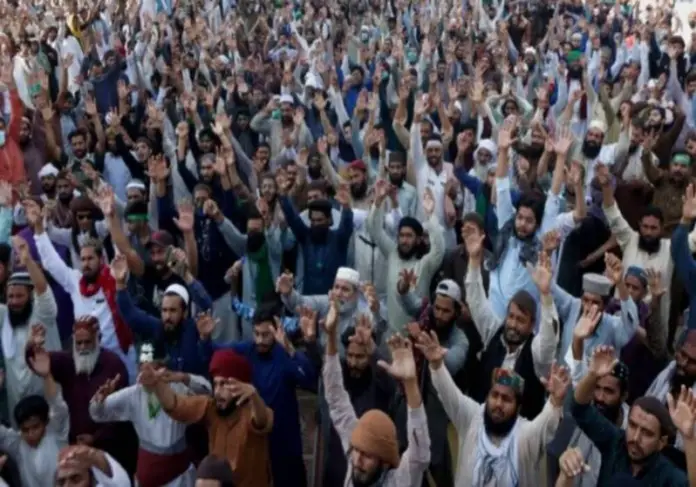The current structural pandemonium in Pakistan, undoubtedly, is a result of the protest by well–known Tehreek-e-Labbaik Pakistan (TLP) who aim to establish Islamic Sharia laws in the state and, does not bear a single word against the dignity of Prophet PBUH.
So much so, talking about the structural pandemonium, it is somehow difficult to decide the right and wrong between the TLP and the government. If someone sees the government and establishment’s view regarding this fanatic movement, they at once think that the government or the head of the state is on the right track – not considering the voice of the group, it is busy in other serious issues of the state.
But the issue is as grave, as anything can take the state towards anarchy and chaos. It is the need of the hour to listen to the demands of other new extremist groups, the head of the state and establishment have to make a perfect platform to handle such conundrums. However the discussion has been seen at various levels on this issue, the international media gave multiple dimensions regarding the spread of extremism in Pakistan – condemning the extremist group, while criticized the government’s policies too. The negotiations between the TLP and PM Khan were being held after dealing with huge disorder and confusion, which was not acknowledged by the world analysts. Therefore, both the TLP and government officials are accountable for this turmoil and lawlessness as one cannot denounce just one side of the two. The reason is that this fundamental group may prove a potential threat to the security of the state; hence the government and establishment must eliminate their mutual distances and take such issues as red-handed – similarly giving respect to all these fundamentalists, a state like Pakistan may create a peaceful atmosphere, which will be favorable to determine the internal variances and the strategic relations with other regional and international countries.
Discussing TLP’s protest, everyone has discussed the government’s attitude too. Pakistan is undoubtedly a developing state, which needs a conducive environment to flourish the economy. It is a fact in international relations that when a country faces domestic anarchy and riots, rival states take maximum advantage of the situation. India, the first neighbouring state adds fuel to fire on the erupting situation by invoking hidden intelligences. Therefore, to handle these challenges a peaceful environment is requisite, which may strengthen the foreign policy of the state.
Foreign policy is the main component to run the state on a systematic ground. A strategic decision, to build relations with other countries, reduces the trade deficit and augments the foreign direct investment opportunities within the state. Nevertheless, it is all possible if a state is passing through appeasing circumstances as internal security challenges generally create hurdles in the progress and prosperity of the state. Moreover, it is the best way to raise democracy in the country, because democracy includes the respect and dignity of human rights voices and demands.
Saad Rizvi’s bail has been a controversial issue recently.
Denouncing one side is not an intellectual way of defense; the TLP’s primary demand remained the bail of their leader Saad Rizvi, which was neglected by the government officials and establishment. Later on, they required a peaceful settlement through dialogue or negotiation, but that was also delayed by the head of the state. However, the protest was stopped by putting large containers in their way, which further led to the killing of many police officers, barriers to transport, digging of roads etc. It is a natural phenomenon that one becomes resistive when their voice is not considered if they put their demands for rights.
In a democratic state, human rights activism is seen as the hallmark of a country’s welfare and opulence. People require their accomplished needs at their home but when they are not listened to, even on the roads, they definitely will create lawlessness and disorder – thus in this case of TLP, the element of negligence by the government is seen to some extent. As it is known, they were pleading just for negotiations with the government over the main issues; and the major issue was the bail of their leader Saad Rizvi. In addition to Saad Rizvi’s bail, initially, they were demanding to cut diplomatic relations with France.
Talking about the recent social and political upheaval, which generated confusion between the government and TLP to decide and negotiate earlier, has lead the state towards the pandemonium in its structure. The confusion regarding not deciding timely often leads states to pandemonium, where driving forces are usually observed bemused. The suggestion at the end is obvious, that to save the country from these affairs, decision makers, civil and military bureaucracy, and the establishment should tackle such issues early on, without allowing these groups to erupt to a large extent.







